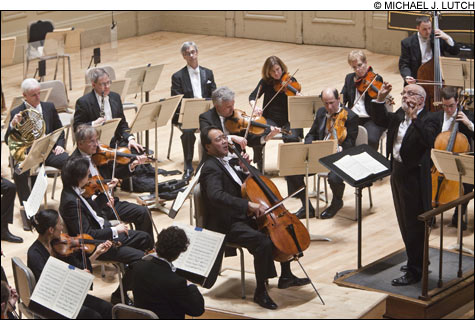
NEVER BETTER Having Ton Koopman's small BSO ensemble behind him meant that Yo-Yo Ma didn't have to push to be heard. |
The Boston Symphony Orchestra programmed a rocking start to the New Year. Animated Dutch early-music conductor Ton Koopman, in his third BSO gig, led Haydn's Symphony No. 98 (often regarded as an elegy for Mozart) and First Cello Concerto, with Yo-Yo Ma. In 2004, Koopman also brought a cellist — Peter Wispelwey, to do C.P.E. Bach. And this time, there was more C.P.E. on the program: the sunlit Symphony in G, a 12-minute gem, played non-stop. Koopman concluded with Schubert's Unfinished Symphony. I wasn't sold on his previous BSO appearance, but this time he had greater dynamic variety, both stealth and exuberance, and more nuanced feeling moment to moment. The Haydn symphony, with only 33 players, was lovely and lively — clean, clear, and full of surprises (sudden stops, long pauses, and the sudden entrance near the end of a harpsichord, played twinklingly by Koopman himself), if not quite plumbing the emotional depths both the score and tradition suggest.
The First Cello Concerto is a specialty of Ma’s (it was one of his first concerto recordings), and he made its daunting technical challenges sound effortless. I've never heard it better. Having a small orchestra behind him meant he didn't have to push to be heard — it was a perfect fit for his Montagnana (the lighter of his two great cellos), which sounds sweeter and fuller the more it's allowed to sing quietly. In the central slow movement, love song and elegy, it was as if that cello's deep velvet were slowly revealing itself from behind the white silk ribbons of fluttering violins.
The Unfinished began in mystery, more rhythmically defined, more deliberate than the usual performance — much leaner, with less vibrato (the early-music influence). Among the striking details were John Ferrillo's yearning, otherworldly oboe solo, like a premonition of Swan Lake, and James Sommerville's unusually long-held horn note setting up an unusually dancing lilt in the famous second theme ("THIS is the SYMphony that SCHUbert wrote but never FINished"). It all had the freshness of a new piece.
The BSO has had a string of impressive string players. Last month, Frank Peter Zimmermann used Fritz Kreisler's Stradivarius in the Martinu Violin Concerto. Last week, Danish violinist Nikolaj Znaider made his BSO debut in Elgar's Violin Concerto with another of Kreisler's violins, the very same 1741 Guarneri del Gesú that Kreisler played at the Elgar premiere in 1910. If not as soulful or "vocally" expressive as 16-year-old Yehudi Menuhin's 1932 recording with Elgar himself conducting, this was still a commanding performance. It's one of the longest concertos in the violin repertory — heartfelt, earnest, tender (probably inspired by Elgar's platonic friend Alice Stuart-Wortley, whom he called "Windflower"), but not without bravura. Within the brilliant finale, there's almost an entire slow movement — a long solo cadenza accompanied by the thrumming of muted strings. Znaider, occasionally referring to a score set up at ankle level, never flagged. Racing or measured, he seemed to charge every phrase with intent, though he himself remained reserved: no lunging, writhing, hair tossing, or eyes gazing heavenward. Sir Colin Davis is an Elgar advocate, and his support was invaluable. He can also be a superb Mozart conductor, but the Prague Symphony that opened the concert (many more players than in Koopman's Haydn) seemed a little sluggish, with the generally slow tempos not as energized as they were in the Elgar.